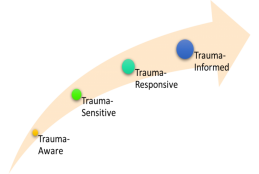Completed
The trauma-informed approach connects a person’s behavior to their trauma response rather than isolating their actions to the current circumstances. At it’s core, a trauma-informed approach looks to ask, “what happened to you?” rather than “what is wrong with you?” It considers a person’s negative life experiences in order to build resiliency, foster connection, and encourage healing, thereby creating higher functioning individuals and better adaptive responses to stress.
The implementation of a trauma-informed approach can also function at the organizational level. Organizations that serve individuals should adapt an approach that addresses individual needs consistent with the approach described above. A “trauma-informed approach” is not a program model that can be implemented and then simply monitored by a fidelity checklist. Rather, it is a profound paradigm shift in knowledge, perspective, attitudes and skills that continues to deepen and unfold over time. Some leaders in the field are beginning to talk about a “continuum” of implementation, where organizations move through stages. The continuum begins with becoming trauma aware and ends with becoming fully trauma-informed.
Adapted from the Missouri Model: Framwork for Trauma Informed MO Department of Mental Health and Partners the Philadelphia ACE Task Force uses this framework to:
- Develop a common language and framework for discussion amongst the Philadelphia ACE Task Force;
- Assess the implementation of basic principles of trauma-informed approaches in various organizational settings;
- Create an online resource of organizations, from across the Greater Philadelphia Area, which are utilizing basic principles of trauma-informed approaches; and
- Enhance the collaboration of organizations from across the Greater Philadelphia Area, which are utilizing basic principles of trauma-informed approaches.
To view the full framework, click here.

